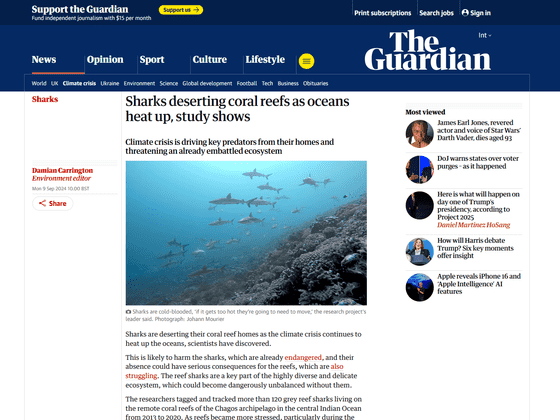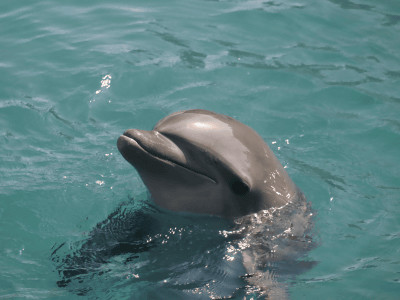Sharks disappear from coral reefs as ocean temperatures rise, disrupting ecosystem balance

by
Grey reef sharks that inhabit the Indian Ocean spend most of their daytime time on coral reefs, but it has become clear that with the rise in sea temperatures in recent years, many grey reef sharks are leaving the coral reefs and migrating to deeper waters.
Environmental stress reduces shark residency to coral reefs | Communications Biology
https://www.nature.com/articles/s42003-024-06707-3
Sharks deserting coral reefs as oceans heat up, study shows | Sharks | The Guardian
https://www.theguardian.com/environment/article/2024/sep/09/sharks-deserting-coral-reefs-climate-crisis-heating-oceans-study

Grey reef sharks live on the reef during the day to avoid larger predators, but at night they leave the reef to feed. When they return, their feces nourishes the reef's inhabitants.
A research team led by David Jacoby of Lancaster University conducted a survey by attaching tracking tags to more than 120 grey reef sharks living in the waters near the Chagos Archipelago in the central Indian Ocean from 2013 to 2020. By combining and analyzing more than 700,000 data points, satellite data, sea surface temperatures, wind and ocean current patterns around the coral reef, it was revealed that grey reef sharks left the coral reefs and moved to other areas during

by
The study also found that it took grey reef sharks up to 16 months to return to the reef after migrating to other areas after the El Niño phenomenon subsided.
'Sharks are cold-blooded animals , meaning their body temperature is linked to the water temperature, so when the water gets too warm, they have to migrate,' Jacoby said. 'We believe many of the grey reef sharks we studied migrated offshore to deeper, cooler waters.'
The grey reef shark is listed as an endangered species due to overfishing and other factors. Similarly, tropical coral reefs have suffered serious damage in recent years due to rising sea temperatures, overfishing, and water pollution. Anna Sturrock of the University of Essex said, 'The grey reef shark plays a very important role in maintaining the ecosystem balance of the coral reef. By eating both herbivorous fish and small predatory fish, the grey reef shark prevents the excessive growth of algae that inhibits coral growth. It is very worrying that the grey reef shark has left the area at the most deadly time for coral reefs, the El Niño phenomenon.' She is concerned that the change in the habitat of the grey reef shark will destroy the ecosystem balance of the coral reef.

On the other hand, it has been reported that some grey reef sharks have remained on coral reefs even during the El Niño event. These reefs are considered healthy and resilient because the coral reefs have become more fertile due to factors such as the eradication of rats on nearby islands and an increase in bird populations. The research team predicted that 'strengthening the protection of coral reefs may help grey reef sharks remain on their home reefs.'
Related Posts:







